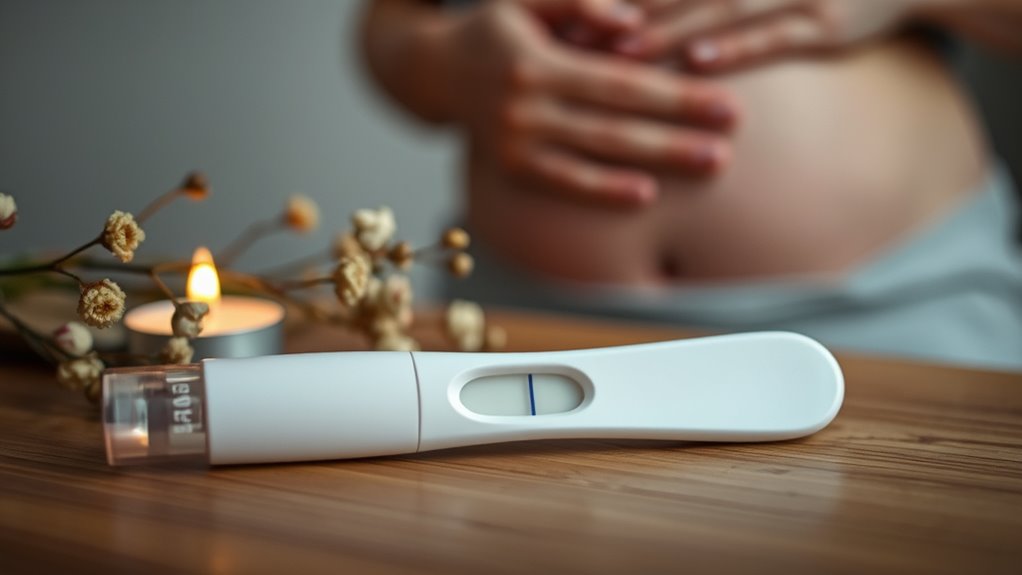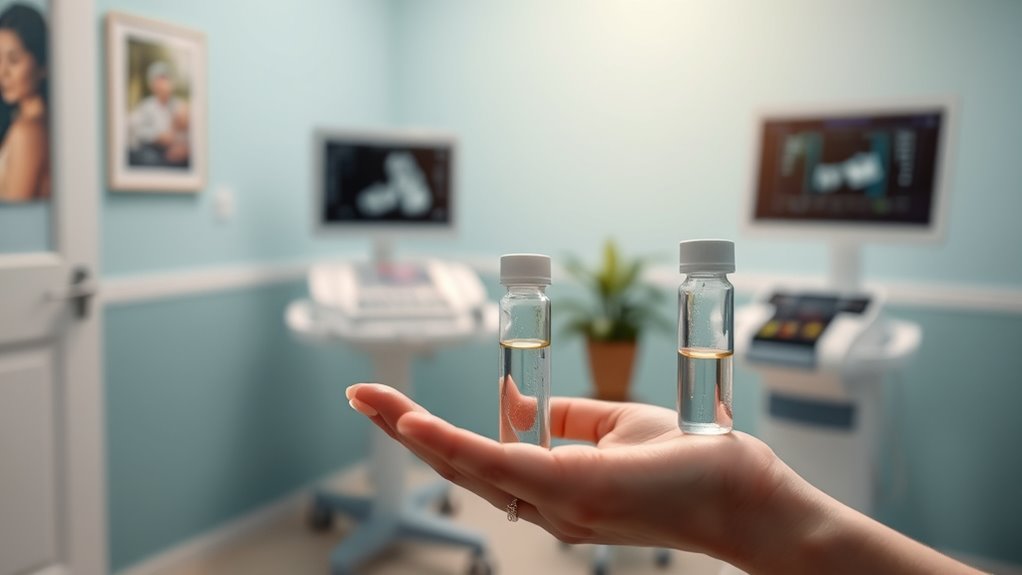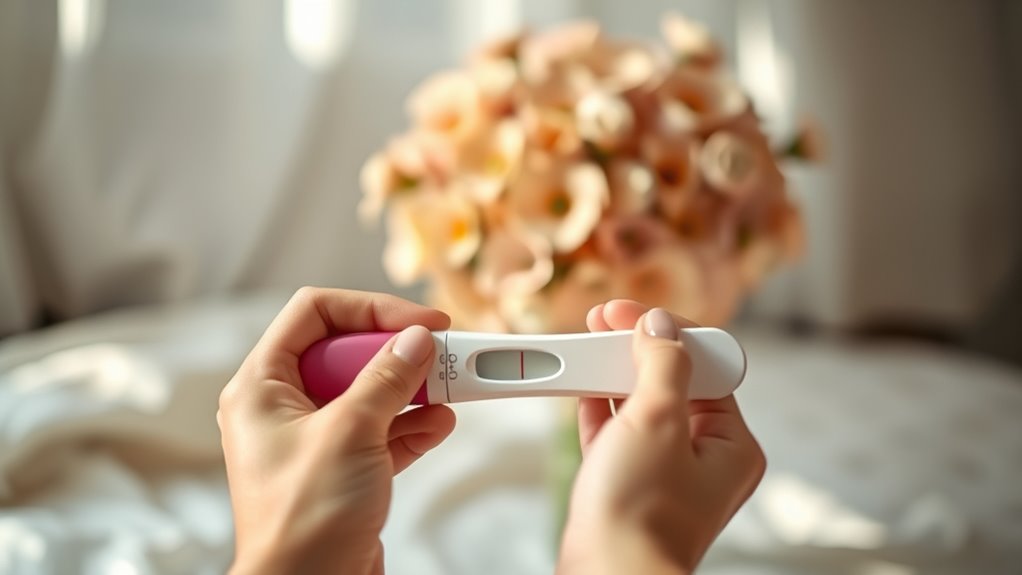A biochemical pregnancy is an early miscarriage that occurs within the first five weeks of pregnancy. You might see a positive pregnancy test due to elevated hCG levels, but the embryo doesn’t develop further. Symptoms can resemble a late period, including spotting and cramping. It’s important to understand causes and how this affects future pregnancies. If you want to learn more about symptoms, diagnosis, and ways to cope, keep exploring the details ahead.
Key Takeaways
- A biochemical pregnancy is an early miscarriage that occurs within the first five weeks, resulting in a positive pregnancy test but no detectable embryo.
- Symptoms may include positive pregnancy tests followed by negative results, heavier menstrual bleeding, and increased cramping resembling intense menstrual cycles.
- Causes primarily involve genetic abnormalities in embryos, hormonal imbalances, maternal age over 35, and uterine abnormalities.
- Emotional support is crucial for coping with grief, and many women successfully conceive in subsequent cycles after a biochemical pregnancy.
- Maintaining a healthy lifestyle and tracking ovulation can enhance future conception chances; consulting a healthcare provider is advised after multiple occurrences.
What Is a Biochemical Pregnancy?

A biochemical pregnancy is an early miscarriage that typically happens within the first five weeks of pregnancy, often going unnoticed. In this scenario, you may receive a positive pregnancy test due to elevated hCG levels, but the embryo fails to develop further and isn’t detectable on ultrasound. Understanding the potential for emotional support during this time can be beneficial, as many women experience a range of feelings following such events. It’s important to note that early detection of potential issues can be crucial in managing future pregnancies.
Genetic abnormalities are the primary cause, accounting for 50-75% of all miscarriages. Many women mistake this for a late period, as symptoms can include a positive pregnancy test followed by negative results and heavier menstrual bleeding.
The good news is that experiencing a biochemical pregnancy doesn’t prevent future successful pregnancies; many women go on to conceive afterward, often with increased chances of success in subsequent cycles. Additionally, maintaining good sexual health can support overall reproductive wellness.
Symptoms of a Biochemical Pregnancy

When you experience a biochemical pregnancy, the symptoms can often be mistaken for a late period. You might start with early positive pregnancy tests, only to see a negative pregnancy test as hCG levels drop.
Many women don’t notice typical pregnancy symptoms like fatigue or nausea, which can lead to confusion about the situation. Instead, you may encounter heavier menstrual bleeding that begins as light spotting and intensifies, along with increased cramping. This emotional response can sometimes mirror feelings of emotional instability, which is often associated with individuals experiencing challenges in personal relationships. It is crucial to maintain effective co-parenting communication during such emotional times to ensure a supportive environment.
The passing of tissue can happen over days to weeks, resembling a more intense menstrual cycle. If you’ve had multiple miscarriages, the emotional impact can be significant, making it essential to seek support and medical guidance during this challenging experience. Additionally, the emotional dysregulation experienced during this time may resemble symptoms of Borderline Personality Disorder (BPD), highlighting the importance of understanding emotional health.
Causes of a Biochemical Pregnancy

When it comes to biochemical pregnancies, genetic abnormalities in the embryo are often at the forefront. These chromosomal issues can hinder proper implantation and development, leading to early loss. Additionally, factors related to your health, like hormonal imbalances, can also play a role in this process. Proper nutrition is essential for overall health and can influence hormonal balance, potentially affecting pregnancy outcomes. Maintaining a balanced diet rich in antioxidants and vitamins can further support reproductive health. Including high-protein breakfasts in your diet may also help stabilize energy levels and support hormonal balance.
Genetic Abnormalities in Embryo
Genetic abnormalities in embryos are often the main culprits behind biochemical pregnancies, frequently leading to early miscarriages. These issues, like chromosomal aneuploidy, arise during egg or sperm formation, resulting in embryos with incorrect chromosome numbers.
In fact, about 50-75% of miscarriages relate to genetic factors that affect embryo viability. If you’re over 35, the chances of these chromosomal abnormalities increase, raising the risk of experiencing a biochemical pregnancy.
It’s essential to understand that most biochemical pregnancies stem from significant genetic issues, which can help alleviate any self-blame you might feel. Additionally, awareness of mental health impacts can be crucial for individuals coping with the emotional challenges of miscarriage and pregnancy loss.
Maternal Health Factors
Understanding the role of maternal health factors can provide insight into the causes of biochemical pregnancies.
Maternal age plays a significant role; women aged 35 or older face a higher risk due to increased chromosomal abnormalities in embryos. Hormonal imbalances, like issues with progesterone or thyroid function, can disrupt implantation, contributing to these early pregnancy losses.
Uterine abnormalities, such as fibroids or polyps, can also hinder proper implantation. Additionally, certain health conditions, including polycystic ovary syndrome (PCOS) and blood clotting disorders, affect hormonal regulation and uterine receptivity, raising the risk of biochemical pregnancies.
Ultimately, genetic abnormalities in embryos are often the primary cause, with chromosomal irregularities preventing successful implantation and development.
Diagnosis of a Biochemical Pregnancy

Diagnosing a biochemical pregnancy involves detecting elevated hCG levels in your blood or urine shortly after implantation, often before you even miss your period.
Your healthcare provider will likely track your medical history and last menstrual period to establish the timeline of your pregnancy and any potential miscarriage. Blood tests are essential in measuring hCG levels; a significant drop in these levels typically indicates a loss within 2-3 weeks of conception.
Unfortunately, ultrasound scans aren’t effective for confirming a biochemical pregnancy, as the gestational sac isn’t visible until about 4 weeks of gestation.
If you’ve experienced recurrent biochemical pregnancies, it’s important to consult with a healthcare provider to explore any underlying issues affecting your fertility.
Management and Treatment Options

After experiencing a biochemical pregnancy, it’s important to focus on management and treatment options that can support your journey moving forward.
After a biochemical pregnancy, prioritize management and treatment options to support your journey ahead.
Typically, no specific medical treatment is needed, as the situation usually resolves on its own. However, continuous monitoring of hCG levels is essential to rule out complications like ectopic pregnancies.
As you cope with loss, seeking emotional support or counseling can be beneficial. Many individuals are encouraged to start trying to conceive again without delay, as numerous go on to have successful pregnancies.
If you face recurrent biochemical pregnancies, consider consulting a fertility specialist to investigate any underlying health issues that may be affecting your chances of conception.
Emotional Impact and Support

The emotional impact of a biochemical pregnancy can be profound, leaving many individuals grappling with feelings of loss, disappointment, and confusion.
If you find yourself feeling isolated, know that reaching out for emotional support is essential. Many have benefited from community forums, where you can share your experiences with others who understand your journey.
Recognizing that biochemical pregnancies are common, affecting 30-50% of women, can provide some solace. Professional emotional support services can also be invaluable, helping you cope with grief and prepare for future attempts at conception.
Engaging with supportive networks fosters understanding and solidarity, reminding you that you’re not alone in this experience. Embrace the support available to navigate through this challenging time.
Risk Factors and Who Is Affected

Understanding the risk factors associated with biochemical pregnancies is essential for anyone maneuvering the complexities of conception.
Chemical pregnancies can affect anyone capable of becoming pregnant, but women age 35 and older are at a higher risk due to declining egg quality. Hormonal imbalances and irregular uterine shapes also contribute to the likelihood of experiencing a biochemical pregnancy.
Conditions like polycystic ovary syndrome (PCOS) and autoimmune disorders can further increase your risk. Additionally, if you have a history of sexually transmitted infections, you might face heightened risks due to potential damage to your uterus or fallopian tubes.
Genetic factors play a role too; women with a family history of chromosomal abnormalities are more susceptible to biochemical pregnancies.
Future Pregnancy Outlook

While experiencing a biochemical pregnancy can be disheartening, it often doesn’t hinder your chances of conceiving in the future.
In fact, many women find they’ve a higher likelihood of successful pregnancy in subsequent cycles. Ovulation can occur just two weeks after a biochemical loss, giving you the opportunity to potentially get pregnant quickly.
However, emotional readiness is essential before trying again, and seeking support can be beneficial. If you’ve faced multiple biochemical pregnancies, consulting with a healthcare provider can help identify any underlying health issues that might affect future attempts.
Tips for Moving Forward After a Biochemical Pregnancy

Moving forward after a biochemical pregnancy can feel overwhelming, but taking proactive steps can help you regain a sense of control.
First, give yourself time for emotional recovery; it’s normal to feel disappointment and grief.
Focus on adopting a healthy lifestyle by maintaining balanced nutrition, exercising regularly, and avoiding harmful substances, as these can boost your chances of future pregnancies.
Keep track of your menstrual cycle and ovulation to optimize your timing for conception attempts.
If you experience multiple chemical pregnancies, consult your healthcare provider for further testing to identify any underlying issues.
Remember, many women who face a biochemical pregnancy go on to conceive successfully, showing that your uterus was receptive to implantation.
Stay hopeful!
Frequently Asked Questions
How Do You Explain Biochemical Pregnancy?
A biochemical pregnancy occurs when you get a positive pregnancy test but experience an early miscarriage, often within the first five weeks.
This happens when the embryo fails to develop properly, usually due to chromosomal abnormalities. You might notice symptoms like a late period or a positive test followed by negative results.
While it can be disheartening, it’s a common occurrence, affecting many women trying to conceive. Understanding this can help you navigate your feelings.
What Is a Biochemical Test in Pregnancy?
A biochemical test in pregnancy measures hCG levels in your blood.
It can detect pregnancy as early as 7 to 10 days after conception, giving you an early indication of implantation.
While a positive result shows that implantation has occurred, it doesn’t guarantee a viable pregnancy, as hCG levels might drop if there’s an early miscarriage.
Regular monitoring of these levels helps track your pregnancy’s progress effectively.
What Is the Difference Between a Biochemical Pregnancy and a Clinical Pregnancy?
A biochemical pregnancy occurs when you get a positive pregnancy test due to detectable hCG levels, but it ends quickly without further development.
In contrast, a clinical pregnancy is confirmed with ultrasound, showing a gestational sac and heartbeat.
You mightn’t notice a biochemical pregnancy since symptoms can mimic a late period, while a clinical pregnancy usually presents more obvious signs like nausea and fatigue as it progresses beyond the early stages.
What Is the Most Common Cause of a Biochemical Pregnancy?
The most common cause of a biochemical pregnancy is genetic abnormalities in the embryo.
These chromosomal issues usually stem from problems during the formation of the sperm or egg, leading to aneuploidy.
Since around 50-75% of miscarriages are linked to biochemical pregnancies, it’s clear that many early losses are due to these genetic factors.
While other factors like hormonal imbalances can play a role, genetic viability is the primary concern.
Conclusion
To sum up, experiencing a biochemical pregnancy can be emotionally challenging, but it’s crucial to know that you’re not alone. Many women face this situation, and research shows that it often doesn’t affect future pregnancies. The body’s early response can be misleading, but it’s a natural part of the reproductive process. Embracing support from loved ones and healthcare providers can help you heal and prepare for the future. Remember, your journey doesn’t end here; brighter days are ahead.









